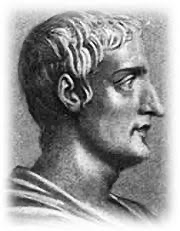The Roman Historian Tacitus
Tacitus was a well-known historian in Ancient Rome. His most famous works chronicle events in the early years of the Empire. He was born in southern Gaul in the 6th decade A.D. Sources offer a range of years for his birth, from 55 to 57. Some sources say that his first name was Cornelius and that he was named after his father. He is thought to have been born into a wealthy family and so was sent to Rome to get the kind of education that money could buy. Historians know few details of his life for sure. He counted Pliny the Younger among his friends. In 77 or 78, he married Julia, whose father, Gnaeus Agricola, was a successful general, notably in Brittania. 
It is a biography of his father-in-law that is Tacitus's first major work. He called it Agricola. In the otherwise celebratory treatment of the general's life, Tacitus discusses much of what was then known about life in Roman Britain. The Agricola was actually's Tacitus's second overall work. The first, Dialogue on Oratory, was a lament for the loss of great speakers like Cicero and was, in fact, written in the style of that noted orator. Published not long after the Agricola was Germania, a very short tract that discusses the lands, laws, customs, and people that made up the Germanic tribes whose settlements and invasions along Rome's north and east borders played a large role in the fate of the Empire. By far the most famous works by Tacitus were the Histories and the Annals. Taken together, they formed a more or less continual narrative of events in the Roman Empire from the death of Augustus in 14 to the death of Domitian in 96. Only four full and a part of one other book of the Histories survived. In these pages, Tacitus discussed the turbulent events of the Year of the Four Emperors, which ended with the ascent of the emperor Vespasian. Tacitus covered not only the palace intrigue that punctuated that time in Roman history but also the kinds of challenges faced by the common people who lived through such momentous change. A full 12 books of the Histories survived; in these pages, he discussed the events of the Empire from the reign of the emperor Tiberius to the first years of the emperor Nero. Included within those surviving pages were accounts of the crucifixion of Jesus, the foundation event of the Christian religion, and of the Great Fire of Rome and the persecutions of Christians in Rome thereafter. Tacitus consulted several primary sources in writing his historical works, including the minutes of the sessions of the Senate, collections of personal letters, and the writings of other historians like Pliny the Elder. Tacitus also had a career in government, serving as quaestor in 81, praetor in 88, consul in 97, and then proconsul of Asia. He served in the Senate and was a well-known lawyer, successfully prosecuting a proconsul for corruption. Most sources list the year of his death as 120.
|
|
Social Studies for Kids
copyright 2002–2026
David White




